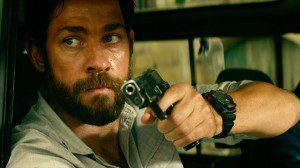
John “Tig” Tiegen came home mad.
He was disgusted by how his fallen comrades were treated after the 13-hour “Battle of Benghazi” on Sept. 11 and 12, 2012. The partisan aftermath frustrated him, too. The politicians “hijacked” the story, he says, and he watched as this real-world struggle in the deserts of Libya became a game of political football on Capitol Hill. Few people seemed to be interested in uncovering the truth, he says. And as a Christian, that bothered him.
“Faith is going to make you want to tell the truth,” he said, “and not make somebody look evil when they’re not.”
13 Hours: The Secret Soldiers of Benghazi is, according to Tig and the other military contract personnel involved that night, an effort to tell the truth. And it may indeed do so: Few but they would definitively know. And like most truths, this one is complicated—full of blood and pain and ambiguity, but also hope and even inspiration.
“This movie is about selflessness,” Director Michael Bay said during a press conference earlier this month. “When there’s so much s— in the world, it’s nice to know that people like [the military contractors in Benghazi] exist.”
Most of the movie takes place in two compounds in Benghazi: the temporary American consulate, which housed Ambassador Christopher Stevens and his team—including two well-trained (though inexperienced, the movie suggests) security guards; and a “secret” CIA facility, safeguarded by a team of six contractors from Global Resource Solutions—former Navy SEALs, Army Rangers and elite Marines. On the evening of Sept. 11, 2012, scores of Libyan fighters attacked and swamped the consulate. The CIA base came under attack after midnight the next morning—the facility’s “secret soldiers” defending it from wave after wave of combatants.
“I don’t know how you survived tonight,” someone tells one of them. “but I know how the rest of us did.”
For 13 Hours, Director Michael Bay set aside his bombastic, crayon-colored Transformers ethos and created a harrowing, taut war movie. This is the best of Bay—lean and stripped of its day-glo accoutrements, his penchant for boom serving the story, not the other way ’round. The acting—particularly John Krasinski as Jack, James Badge Dale as Rone and Pablo Schreiber as Tanto, three of the six GRS contractors—is believable and resonant. Viewers feel the movie’s authenticity, uncomfortably so at times. 13 Hours is well deserving of its R rating.
And while any movie depicting the events in Benghazi that night is bound to feel political, 13 Hours eschews overtly-preachy partisanship for a more “just the facts, Ma’am” approach. A stray comment here or there underscores the idea that these U.S. facilities were undermanned and underprotected. During night’s long hours, we hear and feel the contractors’ frustration that that they’re in this fight alone, and that the U.S. military isn’t coming to the rescue anytime soon. When someone mentions to Tanto that American news reports allege the attacks spontaneously erupted from massive demonstrations, Tanto simply says, “I didn’t see any demonstrations.” There are few pointed fingers, no politicians called out by name: Just a sense that things were mishandled.
But what I was struck by most powerfully was how confusing it must be to operate in these regional hot spots—where everyone carries a gun and it’s impossible to tell who’s friend or foe. If the movie suggests anything, it’s perhaps not that we should’ve been better prepared in Benghazi: Maybe we shouldn’t have been there at all.
Faith, while apparently a big factor in many of these military contractors’ lives, was not so obvious on screen. Tanto talks about his belief that God will protect him. Tig (played by Dominic Fumusa) prays over a fallen comrade. Oz (Max Martini) expresses thanks to the Almighty when help arrives.
But even so, the movie would seem to scratch the itch of many an evangelical who flocked to see American Sniper. Even though 13 Hours doesn’t feature folks currently in the U.S. military, it lauds bravery, teamwork and sacrifice. It embraces the idea that, when you fight shoulder-to-shoulder with someone, you become family.
“Bottom line, this is inspirational,” Michael Bay said at a press conference.
More importantly, Benghazi’s real secret soldiers would argue, it’s the truth. And that’s an important thing to tell.













